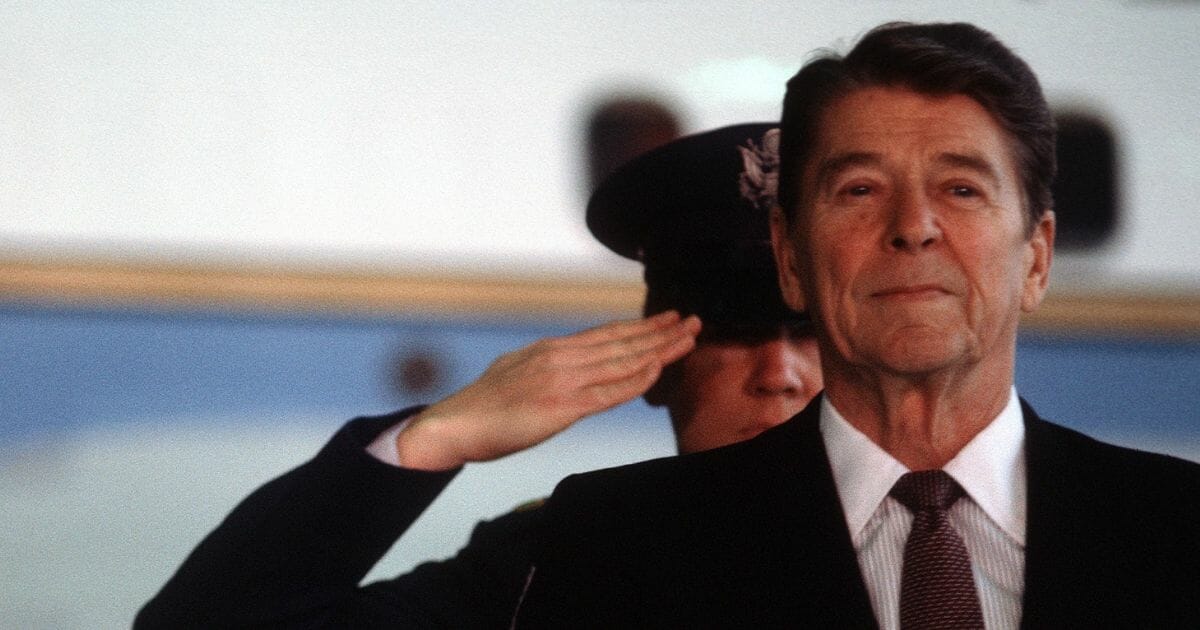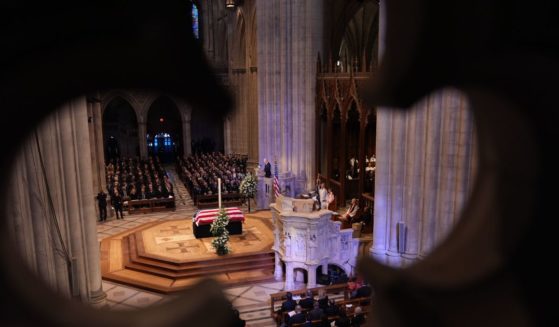
Reagan's Son Talks About His Father's Powerful Legacy on 15th Anniversary of Leader's Death
Wednesday, June 5, 2019, marks 15 years since the death of Ronald Reagan, and his son Michael Reagan says his father’s legacy endures.
“He only wanted to do a couple things as president of the United States: lower taxes, put people to work and end the Cold War. I think he did all three,” Michael told The Western Journal.
“I think my father made people feel good about being an American,” he added. “He made people feel proud about being an American. That had left us during the Carter years, and my father brought that back.”
A recent survey of noted historians conducted by C-Span found Reagan to once again be ranked as one of the top 10 presidents, having moved up two spots over the past two years.
Lee Edwards — a historian with The Heritage Foundation and author of “The Essential Ronald Reagan” — contends Reagan was in fact the greatest president of the second half of the 20th century.
In an email to The Western Journal, he too cited the 40th president’s restoration of the American spirit, as well as the “unprecedented period of economic prosperity” sparked by historic tax cuts and deregulation and the winning of the Cold War “at the bargaining table rather than the battlefield” as the three great achievements of Reagan’s time in office, which spanned the decade of the 1980s.
Reagan inherited a floundering economy with the unemployment rate peaking at nearly 11 percent shortly after he took office (higher than that experienced during the Great Recession of 2008-09), while also having to grapple with double-digit inflation and interest rates.
Following the implementation of his economic plan, the economy grew a third larger (the size of the entire economy of West Germany at the time), while unemployment dropped to under 5 percent, with over 16 million new jobs created.
By way of comparison, 11.3 million were added under former President Barack Obama, though the overall population was 80 million more.
For conservative commentator and former presidential candidate Herman Cain, Reagan’s economic leadership was the signature achievement of his two terms.
“The biggest thing that happened when Reagan was president was what he did to impact economic growth,” Cain said. “We were coming out of a recession under Jimmy Carter and Reagan made some tough decisions, some tough calls.”
“He had to rally not only many of the Republicans, but many of the Democrats to understand we could not allow the United States of America to continue economically to lose ground,” Cain, the former CEO of Godfather’s Pizza during the 1980s, added.
Democrats controlled the House of Representatives during Reagan’s entire tenure in the White House, and held the Senate for his last two years in office.
In addition to wanting to revive the American economy, Michael Reagan said one of the main reasons his father ran for president after serving two terms as California’s governor in the late 1960s and into the mid-1970s is because he grew weary of watching past U.S. leaders always giving in to Soviet demands in an attempt to improve relations between the two nations, which became known as the policy of “detente.”
“He said for too long he had watched American presidents sit down with secretary generals of the Soviet Union, and every time they sat down, the Soviet Union asked the American president give up something to get along with them,” Michael recounted.
“And he said, ‘I wanted to be the first president elected to sit down with the secretary general of the Soviet Union and while he was telling me what I was going to have to give up to get along with him, I was going to get up from my chair, walk around the other side of the table, lean over and whisper in his ear, ‘Nyet.'”
President Reagan did just that at a summit with Secretary General Mikhail Gorbachev in Reykjavik, Iceland, in October 1986. He refused to give in to the communist leader’s demand to abandon the Strategic Defense Initiative missile defense program in exchange for both sides agreeing to reduce the overall numbers of nuclear weapons.
The objective of the SDI program, dubbed “Star Wars,” provided the foundation research for the missile defense system currently guarding America’s shores.
Reagan and Gorbachev would go on to sign the Intermediate-Range Nuclear Forces Treaty in December 1987, which resulted in the removal and destruction of an entire class of nuclear weapons. The achievement was the first time in history countries agreed to reduce their nuclear arsenals.
Floyd Brown — who was a member of Reagan’s 1980 campaign staff and served in his administration — pointed to the former Hollywood star’s faith in God as central to his impact.
“President Reagan at his core had a strong and abiding faith in God Almighty and that translated into a belief that God was in control of men’s lives,” he said. “That God was in control of nations’ lives. He looked at America as a place that was guided by God’s providence.”
Michael Reagan shares this assessment. In the foreword of “Hand of Providence: The Strong and Quiet Faith of Ronald Reagan” by Mary Beth Brown, Michael related that his father loved God and sought to fulfill the Lord’s will for his life.
“When he decided to run for president, he didn’t do it to raise himself up, to be admired, or to have others think he was great,” Michael wrote. “He didn’t do it out of selfish reasons or because it was the most powerful position in the country. He did it out of duty.
“He believed God had called him to be president. He believed God had things for him to do.”
This sense of divine calling was only strengthened when he survived an assassination attempt, which nearly succeeded in taking his life just months after becoming president.
“Whatever happens now I owe my life to God and will try to serve him in every way I can,” Reagan wrote in his diary.
Michael seeks to promote the principles of political and economic freedom his father fought for and to memorialize his achievements through the Reagan Legacy Foundation.
The organization was responsible for placing a plaque in Berlin marking the spot where Reagan issued his famous call to the then-leader of the Soviet Union: “Mr. Gorbachev, tear down this wall!“
The foundation also partnered with the Checkpoint Charlie Museum in Berlin, where a permanent Ronald Reagan exhibit was unveiled in 2009, as well as with the Walkway to Victory Normandy memorial brick project at The Airborne Museum in Sainte-Mère-Église, France, which honors the U.S. soldiers who fought on D-Day and beyond to help liberate a continent.
Reagan was the first sitting American president to visit the Normandy battlefield, where he delivered his renowned “Boys of Pointe du Hoc” speech at a ceremony marking the 40th anniversary of the fight.
“These are the boys of Point du Hoc,” Reagan said, with veterans of the momentous day seated around him.
“These are the men who took the cliffs. These are the champions who helped free a continent. These are the heroes who helped end a war.”
One measure of the impact Ronald Reagan had, according to his son, is in the lives he touched around the globe.
Mary Beth Brown in her book recounted being on a cruise with Michael and his wife in the early 2000s, when a crew member from Romania, a former Soviet bloc country, found out she was serving President Reagan’s son.
“I love President Reagan! He freed my people!” the woman in her early 20s exclaimed, with a big smile on her face.
She then called the head waiter over, also from Romania, who confirmed, “We love President Reagan in my country.”
Michael told The Western Journal this type of reaction is common.
“It doesn’t matter where I go in the world, or where his family goes in the world, you’re respected and you’re loved and you’re appreciated, because of what he accomplished,” he said.
Truth and Accuracy
We are committed to truth and accuracy in all of our journalism. Read our editorial standards.
Advertise with The Western Journal and reach millions of highly engaged readers, while supporting our work. Advertise Today.












